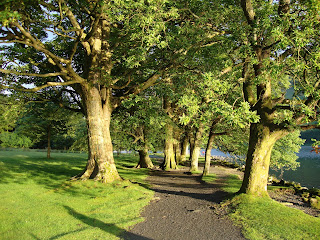Just found this essay by Herman Hesse - his thoughts and feeling about trees. Says it all really...and so beautifully
“For me, trees have always been the most penetrating preachers. I revere
them when they live in tribes and families, in forests and groves. And
even more I revere them when they stand alone. They are like lonely
persons. Not like hermits who have stolen away out of some weakness, but
like great, solitary men, like Beethoven and Nietzsche. In their
highest boughs the world rustles, their roots rest in infinity; but they
do not lose themselves there, they struggle with all the force of their
lives for one thing only: to fulfil themselves according to their own
laws, to build up their own form, to represent themselves. Nothing is
holier, nothing is more exemplary than a beautiful, strong tree. When a
tree is cut down and reveals its naked death-wound to the sun, one can
read its whole history in the luminous, inscribed disk of its trunk: in
the rings of its years, its scars, all the struggle, all the suffering,
all the sickness, all the happiness and prosperity stand truly written,
the narrow years and the luxurious years, the attacks withstood, the
storms endured. And every young farmboy knows that the hardest and
noblest wood has the narrowest rings, that high on the mountains and in
continuing danger the most indestructible, the strongest, the ideal
trees grow.
Trees are sanctuaries. Whoever knows how to speak to
them, whoever knows how to listen to them, can learn the truth. They do
not preach learning and precepts, they preach, undeterred by
particulars, the ancient law of life.
A tree says: A kernel is hidden in me, a spark, a thought, I am life from eternal life. The attempt and the risk that the eternal mother took with me is unique, unique the form and veins of my skin, unique the smallest play of leaves in my branches and the smallest scar on my bark. I was made to form and reveal the eternal in my smallest special detail.
A tree says: A kernel is hidden in me, a spark, a thought, I am life from eternal life. The attempt and the risk that the eternal mother took with me is unique, unique the form and veins of my skin, unique the smallest play of leaves in my branches and the smallest scar on my bark. I was made to form and reveal the eternal in my smallest special detail.
A tree says:
My strength is trust. I know nothing about my fathers, I know nothing
about the thousand children that every year spring out of me. I live out
the secret of my seed to the very end, and I care for nothing else. I
trust that God is in me. I trust that my labor is holy. Out of this
trust I live.
When we are stricken and cannot bear our lives any longer, then a tree has something to say to us: Be still! Be still! Look at me! Life is not easy, life is not difficult. Those are childish thoughts. Let God speak within you, and your thoughts will grow silent. You are anxious because your path leads away from mother and home. But every step and every day lead you back again to the mother. Home is neither here nor there. Home is within you, or home is nowhere at all.
A longing to wander tears my heart when I hear trees rustling in the
wind at evening. If one listens to them silently for a long time, this
longing reveals its kernel, its meaning. It is not so much a matter of
escaping from one's suffering, though it may seem to be so. It is a
longing for home, for a memory of the mother, for new metaphors for
life. It leads home. Every path leads homeward, every step is birth,
every step is death, every grave is mother.
So the tree rustles
in the evening, when we stand uneasy before our own childish thoughts:
Trees have long thoughts, long-breathing and restful, just as they have
longer lives than ours. They are wiser than we are, as long as we do not
listen to them. But when we have learned how to listen to trees, then
the brevity and the quickness and the childlike hastiness of our
thoughts achieve an incomparable joy. Whoever has learned how to listen
to trees no longer wants to be a tree. He wants to be nothing except
what he is. That is home. That is happiness.”













